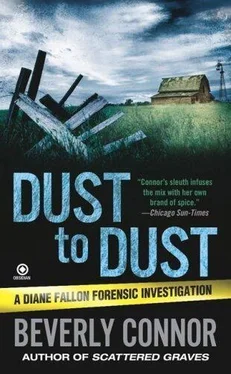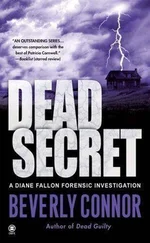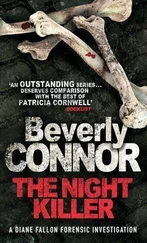Beverly Connor - Dust to Dust
Здесь есть возможность читать онлайн «Beverly Connor - Dust to Dust» весь текст электронной книги совершенно бесплатно (целиком полную версию без сокращений). В некоторых случаях можно слушать аудио, скачать через торрент в формате fb2 и присутствует краткое содержание. Год выпуска: 2009, ISBN: 2009, Жанр: Триллер, на английском языке. Описание произведения, (предисловие) а так же отзывы посетителей доступны на портале библиотеки ЛибКат.
- Название:Dust to Dust
- Автор:
- Жанр:
- Год:2009
- ISBN:9780749941888
- Рейтинг книги:5 / 5. Голосов: 1
-
Избранное:Добавить в избранное
- Отзывы:
-
Ваша оценка:
- 100
- 1
- 2
- 3
- 4
- 5
Dust to Dust: краткое содержание, описание и аннотация
Предлагаем к чтению аннотацию, описание, краткое содержание или предисловие (зависит от того, что написал сам автор книги «Dust to Dust»). Если вы не нашли необходимую информацию о книге — напишите в комментариях, мы постараемся отыскать её.
Dust to Dust — читать онлайн бесплатно полную книгу (весь текст) целиком
Ниже представлен текст книги, разбитый по страницам. Система сохранения места последней прочитанной страницы, позволяет с удобством читать онлайн бесплатно книгу «Dust to Dust», без необходимости каждый раз заново искать на чём Вы остановились. Поставьте закладку, и сможете в любой момент перейти на страницу, на которой закончили чтение.
Интервал:
Закладка:
“For example, one experiment she did was to make vessels with different-colored glazes, put them on a shelf as they may have been arranged in an aboriginal shelter. She’d tip over the shelf and analyze the breakage pattern of the pottery fragments on the floor.”
“And this tells her what exactly?” asked Hanks.
“When excavating a site, you find a lot of broken pottery. Mapping the location of the pieces and then reconstructing them back into a whole vessel tells you something about how it got broken in the first place. In the example I gave, would the patterns of breakage that have been found at many archaeological sites result if the early people had pottery on shelves or racks in their houses? I know it seems like a lot of work for useless information, but archaeology is a lot like crime scene reconstruction-you keep adding pieces to the puzzle and after a while you have the whole scene. They are trying to reconstruct the past in as much detail as they can discover.”
Diane didn’t think she told it as clearly as Jonas did when he spoke with students or tour groups, but Hanks’ and Garnett’s expressions weren’t entirely glazed over with confusion. Then again, neither had she enthused them to become archaeologists.
“So she didn’t take a lot of care making the pottery pieces if she was going to break them,” said Hanks. “They probably weren’t valuable.”
“I think she did take a lot of care,” said Diane. “She wanted to get as close as possible to matching the kind of vessels the Indians used. I doubt her pots were valuable enough to steal. But it may be the thieves thought they were real. Perhaps someone working on her house saw them, knew there was some money to be had in trading in antiquities, and came back with some of his buddies to steal them. Just a thought,” she said. “Do we know who the body in her backyard was?”
Hanks nodded. Apparently he felt more comfortable sharing, at least in the company of Chief Garnett.
“His name was Ray-Ray Dildy. He was a high school dropout, a day worker, and petty thief. Not much on the ball, so I’m thinking he wasn’t the mastermind, just the muscle. I’m looking into his associations now.”
“Could he have worked on Marcella’s house?” asked Diane. “I noticed her front porches are new, as is the floor in the living room.”
“Could have. I’d like to get her daughter to go through her mother’s receipts,” said Hanks. “They might tell us something.”
Diane had been hesitant to ask. Afraid of the answer. But, she had to know. “How is Marcella?” she asked.
“The doctors have her in an induced coma,” said Hanks. “Something about her brain swelling.”
That was what Diane was afraid of. She didn’t know Marcella well, but to a person of intellect like Marcella the possibility of brain damage could be of greater fear than the possibility of death. Diane needed to find out who did this to her.
No one said anything for a moment. Finally Hanks broke the silence.
“You believe Jonas Briggs is innocent of involvement in the attack, don’t you?” Hanks asked Diane.
“Yes,” said Diane.
“Why?” asked Hanks.
“The same reason I believe Chief Garnett wasn’t involved. I know them both,” said Diane.
“That’s hardly a reassuring answer,” said Hanks. “No offense, sir.”
“It is if you trust my judgment,” said Diane. “But you don’t know me.”
“Is your judgment that good?” he asked.
“I think it is most of the time,” she said.
Hanks actually started to smile.
“Other than the fact that he discovered her and called for help,” Diane continued, “there is no reason whatsoever to suspect Jonas. You might as well suspect me.”
“There is the matter of the arguments that were overheard,” said Hanks.
“That’s nothing,” said Diane. “That is the world they live in. Many academics revel in debate. Marcella is one of them. You might as well use breathing as evidence.”
“The witnesses said they were pretty heated,” said Hanks.
“They may have been perceived that way from an uninformed observer’s perspective, but I’d have to have wit nessed it myself to put any value on it,” said Diane.
“Are you that rigid with all eyewitness testimony?” asked Hanks.
“I don’t really deal in eyewitness testimony,” said Diane. “I collect empirical data. But when confronted with eyewitness accounts, I don’t automatically believe them without corroboration. In this case it would take a lot of corroboration because I’ve known Jonas long enough to be able to judge his character.”
“Interesting perspective,” said Hanks.
Diane wasn’t sure what he meant. No one seemed to have anything else to say at the moment, so she stood and the two of them stood with her.
“We’ll have a full forensics report for you as soon as we can,” said Diane.
Hanks thanked her and Diane left the police station. Hanks followed her out to her car.
“I had been told that you are prone to take over a case,” he said. “I didn’t want that happening with this one.”
Diane supposed he was trying to explain his hostility, but he still sounded defensive.
“I don’t know where that rumor came from exactly,” said Diane. “Those times when I have been more involved in a case than my position as a director of the crime lab would dictate that I should, I have been either asked by detectives-here”-she gestured toward the station-“or the perpetrators themselves have pulled me into it by coming after me. I have never just showed up and told a detective that I was taking over his case and would he please hand me his file.”
“I got the impression you were more subtle than that,” he said, almost smiling again.
“There are reasons Garnett occasionally invites me to observe interrogations, and they have nothing to do with any personal interest I might have in the case itself. And he only allows me to observe, nothing else. Today, for instance, I would have advised my friend not to answer your questions without a lawyer present. Not because he was guilty, but because we all know why detectives want to interview people without an attorney present. But Garnett wouldn’t have allowed me to interfere-just observe.”
“That’s very cryptic. Why does he extend that courtesy? He doesn’t to anyone else. Do you get to observe the questioning of all your friends?” asked Hanks.
Diane smiled. “Well, my friends don’t often find themselves in this situation. But the answer is no, not all my friends. Just certain types of friends. After you have been here longer, you’ll figure out why.”
Diane got in her car and left him with a puzzled look on his face. Sooner or later he’d figure out it was not so much about her as it was about the museum and its relation to the crime lab. Garnett and the mayor didn’t want her to tell them to leave and take their crime lab elsewhere.
Diane drove home-home to Frank’s house. She’d left him early this morning when David called and she hadn’t talked with him since. And it was Sunday, the day they usually spent together. She should have told Hanks she was very content to leave his case to him. Did they all think she just went around making work for herself?
Diane parked the SUV in the driveway behind a car she did not recognize. It had Atlanta plates. As she passed by she felt the hood. Warm. It hadn’t been here long.
Frank was a detective in the Metro-Atlanta Fraud amp; Computer Forensics Unit. It must be for him. She hoped they didn’t want him to go in to work. She walked up to the door of the familiar, old Queen Anne-style house and went in.
Chapter 9
Diane was greeted with the aroma of hot coffee when she opened the door. She walked through the small entry into the living room, where she heard talking. She was going to pass by, let Frank know she was home, go take a shower, and let him get on with his business. Then she recognized the voice.
Читать дальшеИнтервал:
Закладка:
Похожие книги на «Dust to Dust»
Представляем Вашему вниманию похожие книги на «Dust to Dust» списком для выбора. Мы отобрали схожую по названию и смыслу литературу в надежде предоставить читателям больше вариантов отыскать новые, интересные, ещё непрочитанные произведения.
Обсуждение, отзывы о книге «Dust to Dust» и просто собственные мнения читателей. Оставьте ваши комментарии, напишите, что Вы думаете о произведении, его смысле или главных героях. Укажите что конкретно понравилось, а что нет, и почему Вы так считаете.












